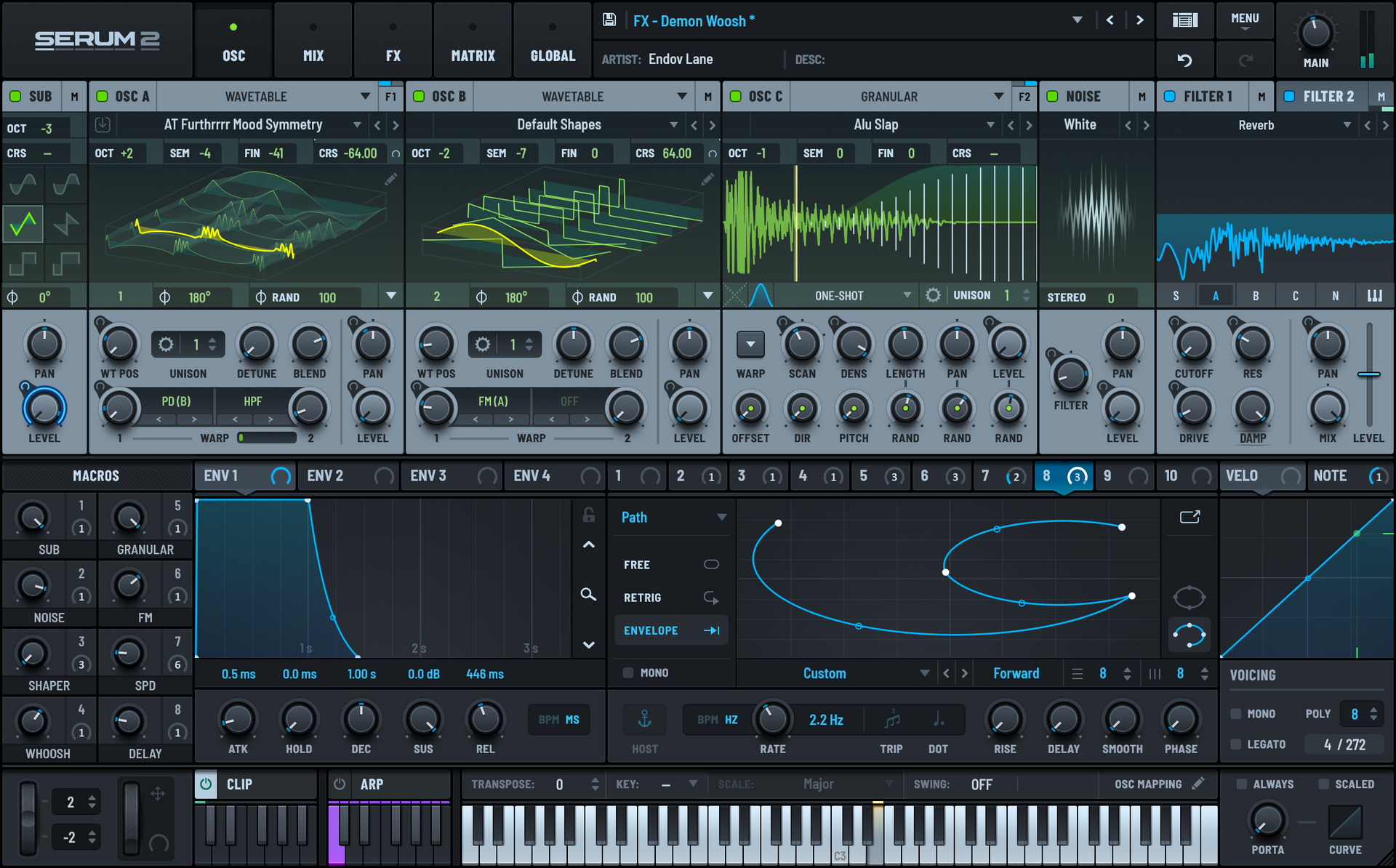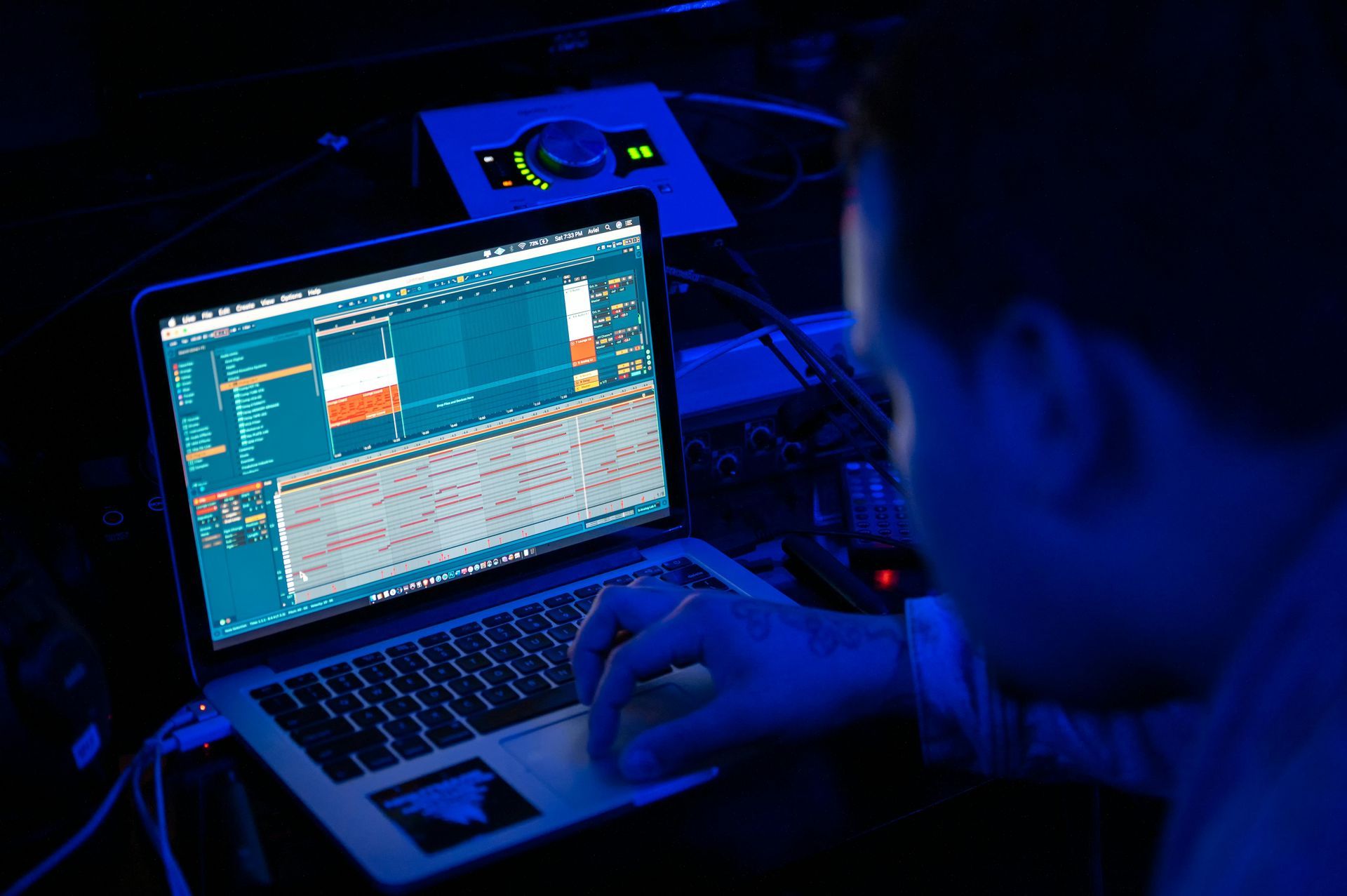Master Sound Engineering Skills at ICON Collective
In the vast ocean of sound, few chart the depths quite like the masters.
ICON Collective excels at bridging the gap between aspiration and tangible skills. With curriculums deeply interwoven with the pulsating heart of the music industry, this institution not only imparts knowledge but also crafts the architects of tomorrow's soundscapes. Here, future sound engineers and producers are meticulously molded, armed with the expertise to make waves in the dynamic sphere of music production.
Dive Into the World of Music Production
At ICON Collective, immersion into music production is not just about acquiring technical knowledge; it is about embodying the creative and sonic ethos that defines the current musical landscape. Students are nurtured to comprehend and harness the nuances of sound design, electronic music theory, and digital music composition, enabling them to construct their unique auditory identity.
The journey with ICON Collective transcends traditional education, connecting students directly with industry professionals and cutting-edge production techniques. These experiences solidify a robust foundation in music technology and empower graduates to leave an indelible mark on the ever-evolving domain of music production.
Hands-On Experience with Industry-Standard Gear
ICON Collective's curriculum emphasizes practicality—students access cutting-edge technology shaping industry standards.
Stepping into ICON's facilities, one encounters an environment where theory intersects with application, bridging the gap between learning concepts and commanding hardware and software integral to the profession.
Here, music production is not an abstract theory; it's a tactile phenomenon—working with professional-grade equipment cultivates proficiency that aligns with the demands of modern sound engineering.
Real-World Music Projects from Day One
From day one, ICON Collective plunges students into authentic production projects, mirroring real industry practices and expectations. This immersive approach fast-tracks the development of essential competencies in sound engineering.
Learners tackle music creation with a professional mindset. They experience the pressures and rewards of industry timelines from the outset.
Students at ICON are not just trained; they're galvanized to fuse theoretical knowledge with real-world application, ensuring they remain on the cutting edge of production methods. Collaborative projects foster a community of creativity, innovation, and excellence.
Interfacing with active industry professionals, ICON students are guided through music projects that culminate in commercially viable products. They gain hands-on experience in production, mixing, mastering, and more, establishing themselves as emergent professionals in the music industry. This makes ICON graduates not mere "students," but invaluable contributors to the music production landscape.
Harness Cutting-Edge Sound Engineering Techniques
ICON Collective imparts audio-engineering skills within the vanguard of industry standards, helping students become adept in state-of-the-art sound manipulation and workflow optimization.
Through intensive instruction, ICON's curriculum ventures beyond theory to embrace digital audio workstations (DAWs), advanced signal processing, and innovative sound design practices, equipping students with the sophisticated skill set required for today's dynamic music industry.
A mastery of "in-the-box" methodologies and "out-of-the-box" thinking is seamlessly integrated to nurture a producer’s unique sonic signature.
Mastering Synthesis and Sampling
At ICON Collective, intricate knowledge of synthesis forms a cornerstone of our music production pedagogy. Proficiency in subtractive, additive and FM synthesis; , unconventional audio manipulation; and analog synthesis processes sharpen the competitive edge of budding producers.
Synthesis isn't simply an elective; it's a foundational pillar at ICON. Relying on this essential skill set can shape impressive aural landscapes.
Moreover, expert sampling techniques are equally emphasized. You learn to capture organic textures (field recordings, acoustic phenomena) and imbue them with musical purpose.
Deep understanding of synthesis and sampling is crucial to original sound creation. It transforms basic oscillations into vivid sonic tapestries, intertwining digital prowess with imaginative expedition.
Leveraging these skills can set a producer apart from his or her peers, fundamentally shaping one’s ability to craft unique auditory experiences that resonate broadly.
Exploration is key to mastery; thus, ICON Collective encourages creative risks within these domains, pushing boundaries and perpetuating innovation in musical expression.
Advanced Mixing and Mastering Strategies
Mastering sound engineering is a dynamic process that transcends mere technical knowledge, integrating artistic intuition with nuanced application. ICON Collective adopts a multidimensional approach, ensuring your mixes are not only technically sound but also emotionally resonant.
Developing the ability to discern and adjust the spectral balance, dynamic range, and stereo image lies at the heart of ICON's curriculum. Students are equipped with advanced mixing techniques that prioritize clarity, punch, and dimensional depth in their productions.
The mastering phase is about pushing a good mix to greatness, necessitating a forensic ear for detail and a firm grasp of signal processing tools. At ICON, you will learn strategies to maintain musicality while ensuring your tracks meet industry loudness standards and translate well across all listening environments.
Diving into the intricacies of software and hardware outboard gear, ICON students are mentored on how to apply EQ, compression, limiting, and saturation in mastering. Knowledge of the analog domain enriches the digital expertise, allowing a seamless blend of old-school warmth with contemporary sharpness.
Equipping you with the understanding to sculpt the final aural polish, ICON Collective strives to empower producers to deliver masterpieces that stand out in an ever-evolving music industry landscape.
Connect with Music Industry Insiders
Engagement with seasoned professionals is a pivotal aspect of the educational journey at ICON Collective. Through our established network, students gain access to music industry insiders, opening doors to mentorship, collaboration, and integral career guidance. This immersive interface is not just a cursory bonus but a deeply ingrained facet of the ICON experience, designed to forge connections that often continue beyond the bounds of the classroom into the professional world. Embrace the opportunity to glean wisdom from veterans and align your musical ambitions with the practical realities of the industry's inner workings.
Collaborate with Established Artists
At ICON Collective, your network expands as you blend talent, energy, and creativity in collaborations that resonate with the industry's pulse. These experiences provide a pragmatic approach to creativity, emphasizing a symbiotic and experiential learning curve that can propel your career forward.
Craft music alongside recognized figures who offer invaluable insight into artistic success. Their expertise helps hone your distinctive sound and strategic positioning within the music landscape.
Real-time feedback from those with esteemed industry clout (accomplished producers, engineers, and artists) accelerates your growth exponentially.
Collaborate on projects that could set the stage for your breakout opportunity, leveraging the valuable partnerships fostered at ICON Collective. This interaction is vital in understanding the nuances of crafting a track that connects with audiences and leaves a lasting impression.
Engagement with these professionals serves as a cornerstone of your education, offering a rare look into the complex processes that govern successful music production, from inception to final master.
Ultimately, your goal is to echo the greats—ICON Collective provides the environment to learn from the best, incorporating their techniques into your own unique artistry.
Direct Feedback from Music Professionals
Receiving critique from seasoned industry veterans fosters a rigorous development of your skills. They offer perspectives rooted deeply in professional experience.
At ICON Collective, direct engagement with music professionals ensures that you receive mentorship that is both relevant and current, informed by contemporary industry standards and practices.
Through this intimate interaction, students gain valuable insights into the intricacies of sound engineering and the elements of a successful production, all under the guidance of those who have mastered the craft.
Students are not only taught the technical skills needed for music production, but also the importance of cultivating a unique artistic identity—an endeavor sharpened by feedback from those who truly understand what resonates within the industry.
This personalized educational journey at ICON Collective empowers your transition from aspiring artist to seasoned professional, adept in the language of music and sound.
Build Your Professional Portfolio
At ICON Collective, creating a body of work that showcases your unique musical vision is paramount. The curriculum is strategically designed to facilitate the production of polished, industry-ready tracks that serve as a testament to your technical proficiency and artistic development. As you advance through the program, you will accumulate a diverse portfolio of work—spanning various genres and styles—that not only reflects your evolving skillset but also positions you advantageously for a competitive market. This portfolio will become a critical asset, aiding in your pursuit of career opportunities and collaborations within the music industry.
Crafting Your Unique Sound
Delving into the realm of sound engineering, ICON Collective cultivates the crucial ability to dissect and enhance sonic elements through meticulous attention to detail and imaginative processing techniques.
The heart of music production lies within the craft of capturing emotion and translating it into sonic form. At ICON Collective, the sophisticated curriculum intertwines theory with practical application, guiding you through the intricacies of synthesis, sampling, and effects processing. Your journey from raw sound to refined track will be marked by a deep understanding of how to mold frequencies and textures to epitomize the emotional intent behind your music.
Moreover, the pursuit of a distinct audio signature is nurtured at ICON Collective. You will explore innovative audio engineering solutions, adopting groundbreaking tools and unconventional methods that allow you to curate sounds that resonate with authenticity. Access to state-of-the-art equipment and exposure to industry trends will embolden your creative expression, propelling your auditory canvas to the forefront of innovation.
Lastly, to cement your music production prowess, ICON Collective's mentorship involve rigorous exercises aimed at honing your critical listening skills. This practice is essential to creating a well-balanced and compelling mix that stands out in today’s sonically saturated market. The guidance received from seasoned industry professionals ensures your final productions bear the hallmarks of quality, creativity, and individuality—a sound unmistakably your own.
Showcase Your Talent to the Industry
ICON Collective's curriculum is keenly designed to bridge the gap between music production education and real-world industry demands, ensuring that students emerge as adept and industry-ready producers. Our courses, rich with hands-on experience, pave the way for your smooth transition into the professional sphere.
Through project-based learning and collaborations, you'll craft portfolios that mirror industry standards and articulate your unique musical vision. Your body of work will speak volumes of your capabilities and readiness for the music industry.
Additionally, ICON engages with music industry professionals who provide insightful feedback, opening doors for networking opportunities that are invaluable in the music business. This form of direct engagement positions you favorably in the eyes of potential collaborators and decision-makers.
Our strategic partnerships with record labels and music platforms facilitate showcase opportunities that amplify your visibility to influential figures in the music scene. You'll engage directly with the pulse of the industry, gaining unprecedented access to career-launching platforms.
Participation in exclusive ICON events connects you with peers and industry veterans alike, providing a stage to display your talents and forge significant relationships. These experiences cement your presence within the industry and demonstrate to professionals that you are prepared to contribute at a high level.
Ultimately, ICON arms you with not only the expertise but also the platform required to make your mark in the music world. Through concerted effort and ICON's guidance, your transition from student to professional will be seamless and your sound unforgettably distinct.
What does a sound engineer do?
A sound engineer is a professional responsible for managing and manipulating audio for various purposes. They work in different fields, such as music production, live sound reinforcement, film, television, and broadcasting.
In music production, sound engineers contribute to the creation and refinement of sound recordings. They collaborate with artists and producers to achieve the desired sound quality and aesthetic. Sound engineers handle tasks such as recording, mixing, and mastering, using specialized equipment and software to ensure the best sonic experience.
Live sound engineers are responsible for the technical aspects of sound during live performances. They set up and operate sound systems, microphones, and other audio equipment to ensure clear and balanced sound for the audience and performers. Live sound engineers must have a good understanding of acoustics and know how to optimize sound in different venues.
In film, television, and broadcasting, sound engineers capture and manipulate audio for visual media. They record dialogue, sound effects, and music, and mix them together to create a cohesive audio experience. They also work closely with directors and editors to ensure that the audio enhances the overall storytelling.
Overall, sound engineers play a crucial role in the creation and delivery of high-quality audio in various fields. They combine technical expertise, creativity, and a deep understanding of sound to shape and enhance the listening experience for audiences. Their work is essential in bringing music, live performances, and visual media to life.
Is it hard to be a sound engineer?
Being a sound engineer can be a challenging yet rewarding career. In today's music industry, sound engineers play a crucial role in ensuring that the sound quality of recordings and live performances is at its best. They are responsible for capturing, mixing, and mastering audio to create an optimal listening experience for the audience.
To excel as a sound engineer, one must have a solid understanding of audio equipment, acoustics, and sound principles. This includes knowledge of different microphones, mixing consoles, signal processors, and recording software. It also requires a good ear for identifying and adjusting frequencies, dynamics, and spatial positioning to achieve the desired sound.
Attention to detail is essential in this field. Sound engineers need to carefully listen and analyze audio content, making accurate judgments about levels, balance, and clarity. They must be able to troubleshoot technical issues that may arise during recording sessions or live events and quickly adapt to unexpected changes.
Moreover, sound engineers must possess strong communication and interpersonal skills. They need to work closely with musicians, producers, and other industry professionals, understanding their creative vision and translating it into the technical aspects of sound production.
Becoming a skilled sound engineer requires years of experience and continuous learning. Keeping up with the latest advancements in audio technology and industry trends is crucial. Building a network within the music industry and gaining practical hands-on experience through internships or apprenticeships can also greatly contribute to one's success in this field.
Overall, while being a sound engineer may present its challenges, the opportunity to work with music, shape the sonic landscape, and bring art to life is what makes it a thrilling and fulfilling journey for those passionate about sound.
Can anyone be a sound engineer?
Anyone with a passion for music and a desire to learn can become a sound engineer. While it may seem like a complex and technical field, it is not exclusive to a select group of individuals. With the right education, training, and experience, anyone can develop the skills needed to excel in this profession.
Sound engineering requires a keen ear and an understanding of how to manipulate sound. It involves working with audio equipment, recording and editing sound, and creating a balanced mix. While technical knowledge is important, creativity and a good musical sense are equally valuable in this field.
To become a sound engineer, one must be willing to put in the time and effort to learn the necessary skills. This can be achieved through formal education programs, such as studying music production in a college or specialized training institute. Additionally, hands-on experience and internships are crucial in gaining practical knowledge and building a strong portfolio.
While the path to becoming a sound engineer may require dedication and hard work, it is definitely attainable for anyone with a genuine interest in the field. With the right mindset, education, and experience, anyone can develop the skills and expertise needed to succeed as a sound engineer.
So, if you have a passion for music and a desire to work behind the scenes, don't hesitate to explore the world of sound engineering. It is a dynamic field that offers opportunities for creativity, technical skill development, and the chance to be a part of the music production process.
How does sound engineering impact music?
Sound engineering plays a crucial role in the production and impact of music. It involves the technical and creative aspects of recording, mixing, and mastering audio to create a high-quality and engaging listening experience.
By utilizing various equipment and techniques, sound engineers can manipulate and shape the sound of individual instruments and vocals. This process helps to ensure clarity, balance, and cohesiveness in the overall mix of a song. With their expertise, sound engineers can bring out the best in each element, enhancing the impact and emotional depth of the music.
Additionally, sound engineering also contributes to the overall sonic aesthetic of a song or album. Engineers work closely with artists and producers to achieve a desired sonic vision, using effects, processors, and spatial techniques to create unique and immersive soundscapes. These sonic choices can greatly impact the mood, tone, and atmosphere of the music, adding depth and enhancing the overall artistic expression.
Moreover, sound engineering plays a vital role in live performances. Sound engineers are responsible for ensuring that the sound in concerts and events is clear, balanced, and enjoyable for the audience. They handle the technical aspects of live sound reinforcement, including setting up and operating sound systems, microphones, and other audio equipment. Their expertise ensures that every instrument and voice is heard clearly and accurately, enhancing the impact and enjoyment of the live music experience.
In essence, sound engineering has a profound impact on music by shaping its sonic qualities, enhancing its emotional impact, and ensuring a high-quality listening experience. It is a crucial technical and artistic element that complements the creative vision of musicians and producers, bringing their music to life and captivating audiences around the world.
What tools do sound engineers use?
Sound engineers rely on a variety of tools to create and manipulate audio. One essential tool is a digital audio workstation (DAW), which serves as the central hub for recording, editing, and mixing tracks. DAWs like Pro Tools, Logic Pro, and Ableton Live provide a range of features and plugins to help sound engineers shape the sound to their liking.
In addition to a DAW, sound engineers use an array of hardware devices. Microphones play a pivotal role in capturing live sound, with dynamic, condenser, and ribbon microphones being common choices. Mixing consoles allow engineers to balance and blend multiple audio sources, adjusting levels, EQ, and effects. Signal processors like compressors, equalizers, and reverbs help shape the tone and dynamics of sounds.
Sound engineers also rely on monitor speakers or headphones to accurately hear and assess the audio they are working on. These monitors are designed to provide a flat frequency response, ensuring that the engineer can hear the audio without any added coloration. Additionally, sound engineers use cables, connectors, and audio interfaces to facilitate the connection between their equipment and the audio sources.
As technology evolves, sound engineers are incorporating virtual instruments and plugins into their workflow. Virtual instruments simulate the sounds of traditional instruments and often offer advanced synthesis and sound manipulation capabilities. Plugins, on the other hand, provide additional effects and processing options that can be applied within the DAW.
Staying up-to-date with the latest tools and technology is crucial for sound engineers, as it allows them to continually explore new possibilities and create high-quality audio productions. By mastering these tools, sound engineers have the power to shape and enhance the sonic landscape in exciting and innovative ways.



